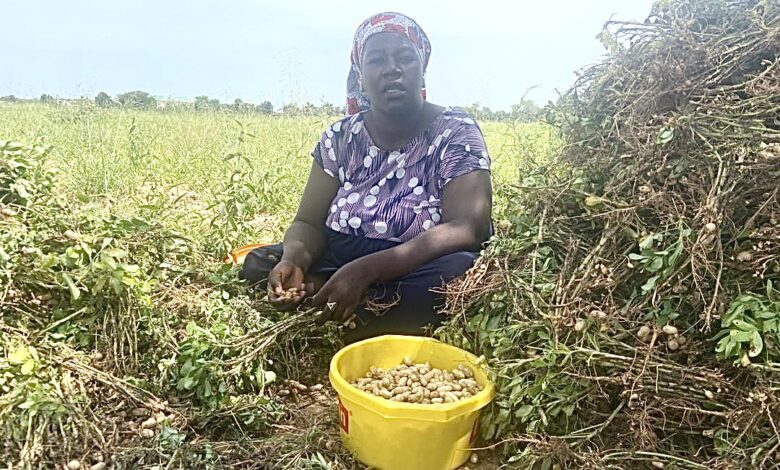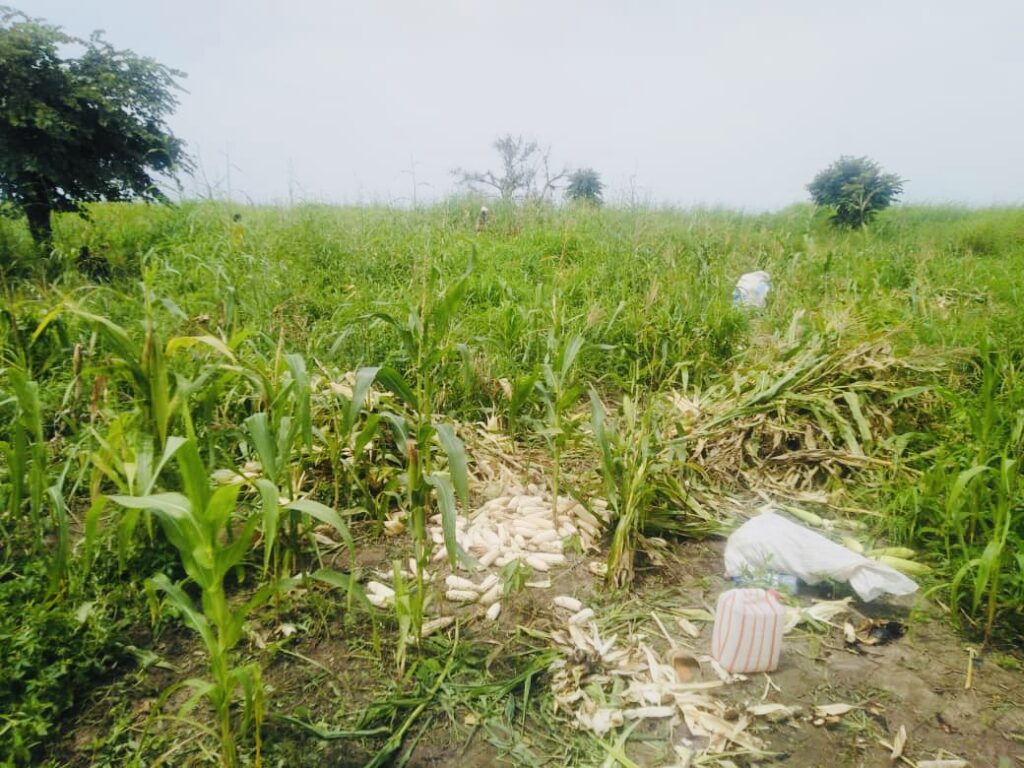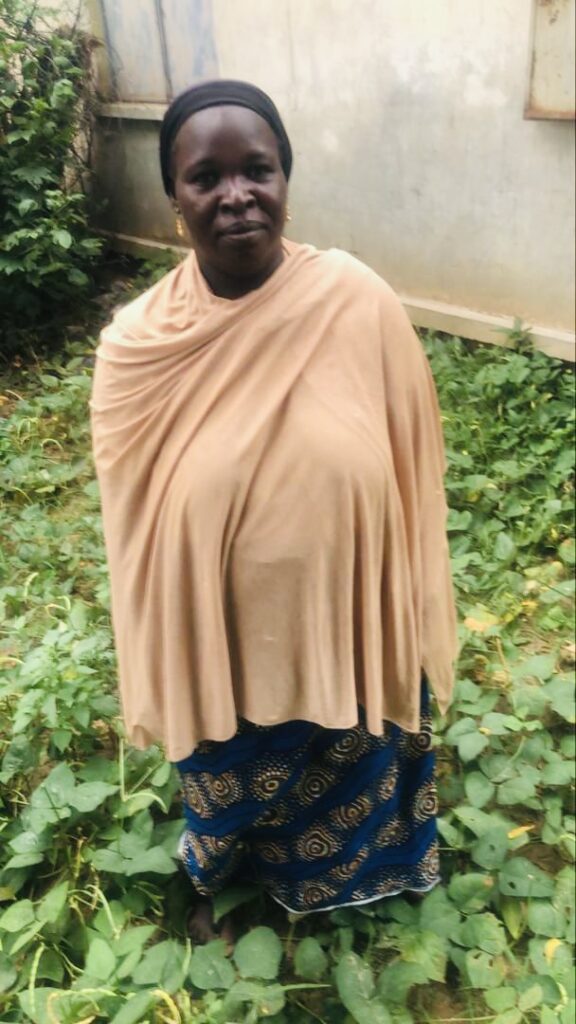Rural Women Farmers in Nigeria’s North East Persevere Despite Theft, Climate Change, and Inflation
As the world observes the International Day for Rural Women, this year’s theme, ‘Rural Women Cultivating Good Food for All,’ resonates with rural farmers’ challenges across Nigeria’s northeastern states. These women, who are the backbone of food production in their communities, share their stories of resilience in the face of theft, climate change, and rising costs.

Yagana Bukar, a 44-year-old widow from Kukareta, a rural community in Damaturu, Yobe state, northeastern Nigeria, relies entirely on farming to sustain her family. “My late husband left me with eight children, and currently, six of them are in school,” she told HumAngle. For Yargana, farming is not just a job but a lifeline.
However, farming in Kukareta is restricted. In the past, criminals used farmlands to hide among tall crops, prompting authorities to mandate that only tuber and root crops could be cultivated.
“The criminals used to take advantage of shrubs and corn fields to hide, so we were asked not to farm crops that grow tall,” Yaragana says. As a result, she grows groundnuts, beans, and bambara nuts.
“I use three hectares of land to plant the groundnuts, and at the end of every farming season, I harvest about 10 to 9 bags of unpeeled groundnuts per hectare. That’s 30 bags in total. I get about a bag and a half of beans, and the same applies to the Bambara nut,” she added.
In Billachi, a village in Demsa local government area, Adamawa state, 50-year-old Walkiya Mathew has taken up large-scale rice and corn farming. Also a widow and sole breadwinner since her husband’s demise, Walkiya has supported her family through farming for over a decade.
“I [cultivate] rice and corn because we consume corn flour at home, and as for the rice, we eat small and sell most of it to traders,” she told HumAngle. Walkiya cannot ascertain the length and width of her farm, but judging by the yields at the end of every farming season, it’s quite a large farm. She harvests 30 to 40 bags of rice and corn each season.

Walkiya’s daughter, Esther, 26, has also embraced farming. “I saw that farming was good, so I decided to try it. I chose soybeans because they are more profitable and require less energy,” Esther said.
Her target consumers are business people who purchase soybeans to make tofu and soya milk.
But Walkiya’s success came under threat this year when floods swept away her entire rice field. “The floods don’t happen often, but when they do, you just have to accept it,” she reflects.
Walkiya said the floods will leave many in her community who rely on her produce disappointed this year. She explained to HumAngle that her community benefits most from her farm, as a large portion of her harvest is bought directly by people in the neighbourhood. As a result, she rarely needs to take any produce to the market.
“I start selling my rice from the farm,” she said. “I sell to anyone who is in need.”
In Borno, another northeastern state, 49-year-old Tani Bitrus describes farming as her “source of wealth.” Like her parents, Tani has dedicated her life to farming, focusing on groundnuts, which she sells to traders and uses to produce oil and kuli-kuli (groundnut cake). Her hard work yields a profit of around ₦200,000 annually.
“Sometimes, I harvest about 20 bags or more at the end of every farming season, which I sell to sort my family’s needs,” she said.

Tani also supplies seeds to other farmers in her community. “Sometimes, I dash out the groundnuts in measures to people who are hungry,” she said, further illustrating the communal spirit of these rural women.
Good food for all against all odds
In Nigeria, agriculture plays a vital role in the economy, offering a livelihood to many people across the country. Unlike oil, which benefits a limited group, farming supports the majority of Nigerians, particularly in rural areas.
The second Sustainable Development Goal aims to eliminate hunger by 2030, but projections show that over 600 million people globally could still face hunger. This highlights the difficulties in achieving zero hunger, as conflict, climate change, and deepening inequalities continue to pose significant obstacles.
The United Nations acknowledges that rural women are essential in ensuring food security, building climate resilience, and driving economic growth. However, they face disproportionate environmental, economic, and social challenges.
In rural communities within Nigeria’s northeast, theft is rampant. “Thieves disturb us a lot around here,” Yargana lamented. “They harvest the groundnuts and go with it, then abandon the leaves for us on the farmland to discover in the morning.” Walkiya, already grappling with losing her rice field to floods, says her corn crop has also been targeted by thieves, forcing her to harvest early, resulting in unripe produce that she can’t sell.
Rising farming costs, particularly fertiliser prices, pose another challenge. Tani and Walkiya both said they struggle to afford the industrial fertiliser they need, relying instead on traditional alternatives like cow dung.
“The things I cultivate require good fertilisation, but I can’t afford much, and this affects the quality and quantity of my harvest,” Walkiya said.
Yet, despite these setbacks, the women are determined. “I wish the government could support us with fertilisers so that we could cultivate more food,” Yagana added. “If I can access subsidised fertiliser, I’ll expand my farm and grow more than I have been doing,” Walkiya also noted, echoing the sentiment shared by many rural farmers. “I will even employ the use of machines, and my community members will have access to more food.”
Yagana is also worried about the hike in the price of groundnut seedlings due to inflation. She explained that the surge in the cost of groundnut seedlings this year was the highest she had ever recorded as a farmer.
The flooding, which has ravaged communities in northeastern Nigeria, has also impacted several rural farmers like Walkiya and Yagana. The floodwaters swept her rice farm leaving her with a huge loss, now she is relying on the proceeds from her corn harvest. Walkiya disclosed that she makes over ₦300,000 profit from selling the harvested bags of rice after taking out the money spent on seedlings, fertiliser, and manual labour. The case is different this year because of the floods.
“There are challenges that come with farming. When It rained heavily, the water flowed into our farms, destroying some of our crops,” Yagana recounted.
She explained that the water passage was so vast that the heavy rainfall and flood damaged a large portion of her groundnut farm, leading to huge losses for her and other farmers.
“We didn’t know how to manage it. We tried our best by looking for empty cement sacks, filling them with sand, and placing them around the water pathway. The floods came when some groundnuts were not ripe, and we bore the loss as God’s will,” Yagana added.
Although the recent floods in Maiduguri spared her farm, Tani is deeply concerned for her neighbours and family members whose farmlands were destroyed.
“As a farmer, patience is key because there are things you cannot control,” Walkiya added.
As the world aims to eliminate hunger by 2030, the stories of Yagana, Walkiya, Tani, and countless other rural women highlight the need for greater support in achieving this goal. Without it, the dream of good food for all may remain out of reach.
Additional reporting by Maryam Suleiman Yalwa and Usman Abba Zanna
Yagana Bukar, a widow in northeastern Nigeria, relies on farming to support her family but faces agricultural restrictions due to security concerns. Despite farming challenges, she cultivates groundnuts, beans, and bambara nuts. Walkiya Mathew, another widow in Adamawa, engages in large-scale rice and corn farming, with her daughter Esther focusing on soybeans. Floods have devastated Walkiya's farm, affecting her community's food supply. Similarly, Tani Bitrus in Borno benefits from farming but faces the challenges of theft and expensive fertilizers, impacting her yield of groundnuts, which she uses to support her family and community.
Agriculture plays a crucial role in Nigeria's economy, offering livelihoods to many, yet rural women like Yagana, Walkiya, and Tani face environmental, economic, and social challenges. Patience and resilience are necessary amidst unpredictable weather and theft. Rising costs, particularly for fertilizers, further strain their efforts, with all three women expressing a need for government support. As the world seeks to eliminate hunger by 2030, stories like theirs underscore the urgent need for backing rural farmers in overcoming these hurdles and ensuring food security.
Support Our Journalism
There are millions of ordinary people affected by conflict in Africa whose stories are missing in the mainstream media. HumAngle is determined to tell those challenging and under-reported stories, hoping that the people impacted by these conflicts will find the safety and security they deserve.
To ensure that we continue to provide public service coverage, we have a small favour to ask you. We want you to be part of our journalistic endeavour by contributing a token to us.
Your donation will further promote a robust, free, and independent media.
Donate HereStay Closer To The Stories That Matter




